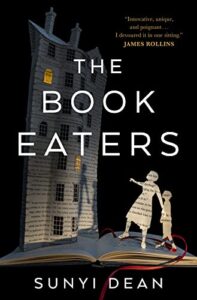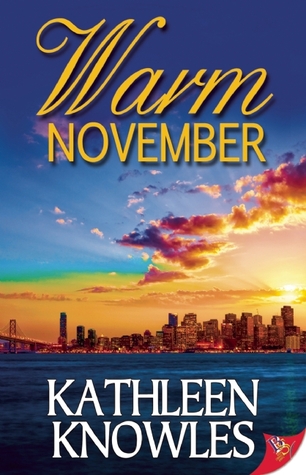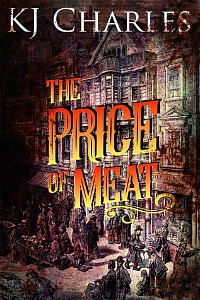Amazon Affiliate Link | Bookshop.org Affiliate Link
This dark fairy tale dances on the line between fantasy and horror. It follows Devon, a book eater, who is part of one of the aristocratic houses of book eaters (think vampires, but they eat books instead of drinking blood). She is one of very few women book eaters, which means she is primarily valued for her ability to get pregnant. (We only are introduced to cis book eaters.) She’s raised on a strict diet of fairy tales and is expected to be married to two successive houses, producing an heir for each and then leaving the child with them.
When we meet her, though, she’s on the run with a mind eater child. Instead of being born with a craving for ink, Cai craves human minds. She should have left him to be controlled by the house, weaponized and dehumanized, but she refuses. She’ll stop at nothing to keep Cai safe–including finding people for him to feed on, leaving them either dead or robbed of their memories and senses. Her only hope is to find the secretive house creating a drug that stops mind eaters from having to feed on minds to stay alive.
This book rotates between current day and how Devon ended up here, starting from her childhood. Despite having a rough idea of Devon’s past before getting those chapters, I was just as absorbed in her backstory as in the present day perspective.
From the premise, I thought of this as a horror novel, but despite the bloodiness and, well, the idea of a mother hunting and sacrificing people to her mind eating son, it reads more as a fantasy to me — a fantasy novel with teeth.
This is a fascinating look into the horrors we can do for love, especially maternal love. At several points, Devon reiterates that love isn’t necessarily a good thing. Her love for her son has left a trail of bodies in its wake. And to be clear, Cai isn’t just a monster. He is a sweet, intelligent boy who doesn’t want to feed on people. Despite her love for him, though, Devon knows her life would be better without him. Maybe the world would be, too. She’s daydreamed about his death even while stopping at nothing to keep him alive. Maybe that’s the horror, more than the deaths.
This narrative is also concerned with the gendered ways people are raised, and the limited set of expectations and imagination we have because of them. Book eaters are said to be without imagination; they can’t actually write any stories themselves. They can only conceive of what’s been fed to them, and with Devon and the other book eater women, those stories are carefully selected to encourage them to be passive and obedient.
Because this is the Lesbrary, of course Devon is sapphic, and she also has a minor romantic subplot with another woman. This is a small part of the book, but it was interesting.
I will say that this felt a little distanced, like watching the story unfold from above instead of being right in the thick of it. I’m not sure how to describe that or why it gave me that impression, but I know lots of readers balk at that sort of story. For me, it matched the generally thoughtful and even philosophical tone of the story, but your miles may vary.
This was a thought-provoking and unsettling read that is perfect for fall.
Content warnings: body horror, gore, violence, domestic abuse, and violence against children


